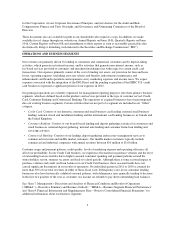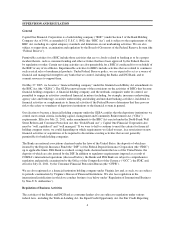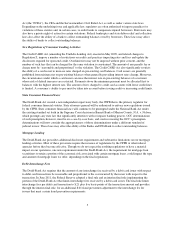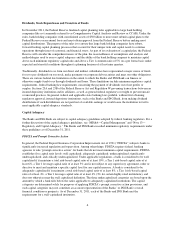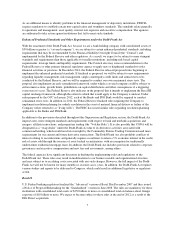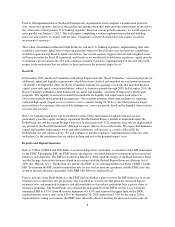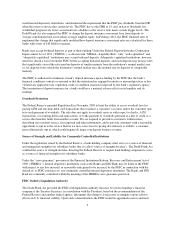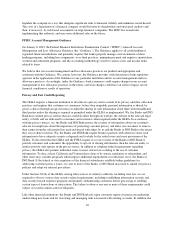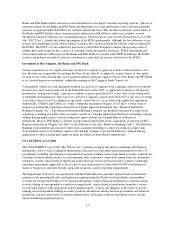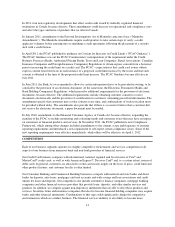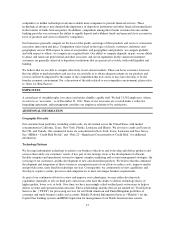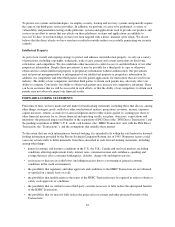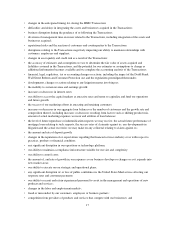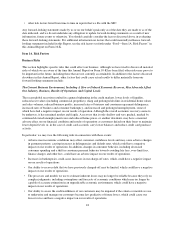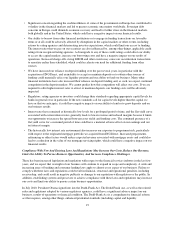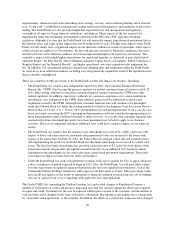Capital One 2011 Annual Report Download - page 33
Download and view the complete annual report
Please find page 33 of the 2011 Capital One annual report below. You can navigate through the pages in the report by either clicking on the pages listed below, or by using the keyword search tool below to find specific information within the annual report.consumer credit regime currently regulated by the Office of Fair Trading (“OFT”) should become the
responsibility of a single regulator and/or whether the existing underlying legislative framework for consumer
credit regulation (under the Consumer Credit Act 1974) should be replaced with a model similar to regulation of
other retail financial services (under the Financial Services and Markets Act 2000). The consultations suggest
that the U.K. Government intends that the FCA be a more engaged regulator, with involvement earlier in a
product’s lifecycle. The U.K. Government has confirmed there is a consensus amongst consultation respondents
in favor of transition to a single regulator of consumer credit (FCA being identified as the likely best regulatory
body to perform this function). The U.K Government has also confirmed there was no clear consensus over
potential changes to the underlying legislative framework regulating consumer credit. The U.K. Government has
indicated that further policy development work is needed to enable it to make a determination on the future of
consumer credit regulation.
Cross-border interchange fees are under scrutiny from the European Commission (“EC”) and the OFT. The
timing of any final resolution of the matter by the EC or the OFT, which has suspended its own investigation into
domestic interchange, is uncertain, but it is anticipated that the OFT will await the outcome of the EC court
decision before concluding its own investigation, currently expected to be Spring 2012. If the EC decision is
appealed to the European Court of Justice, we would expect the OFT to continue the suspension. An appeal to the
European Court of Justice is unlikely to be decided before 2014.
In January 2012, the EC released a Green Paper that aims at identifying potential measures to create an integrated
European market for card, internet and mobile payments. The current scope of the paper is broad and includes
issues such as: market fragmentation; transparency and cost effective pricing of payment services; lack of
standardization; interoperability between payment service providers; and security/privacy concerns of payment
service users. The paper also looks at whether interchange arrangements create challenges for a fully integrated
European market, which may increase the likelihood of further legislation in this area outside of the court process
outlined above. The EC will review comments from interested parties, which are due April 2012, to decide next
steps and what, if any, further regulation is required to create a single European market.
Following a referral by the OFT, the Competition Commission (the “CC”) launched a market investigation into
the supply of Payment Protection Insurance (“PPI”) in the United Kingdom. The scope included PPI on
mortgages, credit cards, unsecured loans (personal loans, motor loans and hire purchase) and secured loans. In
October 2010, the CC published its final report on remedies, and the final Order was published in March 2011.
Implementation of the main new remedies was split. The first phase was introduced in October 2011 and the
second will be introduced in April 2012, with the April 2012 phase including a seven-day point of sale
prohibition.
Following the dismissal of the British Bankers Association’s judicial review, firms, including COEP, have had to
comply with new rules introduced by the FSA in December 2010 governing the handling of PPI complaints. The
new rules have resulted in changes to the way that the industry handles PPI complaints and the associated media
attention has led to a significant increase in PPI complaint volumes.
Canada
In Canada, COBNA operates as an authorized foreign bank pursuant to the Bank Act (Canada) (the “Bank Act”)
and is permitted to conduct its credit card business in Canada through its Canadian branch, Capital One Bank
(Canada Branch) (“Capital One Canada”). The primary regulator of Capital One Canada is the Office of the
Superintendent of Financial Institutions Canada (“OSFI”). Other regulators include the Financial Consumer
Agency of Canada (“FCAC”), the Office of the Privacy Commissioner of Canada, and the Financial Transactions
and Reports Analysis Centre of Canada. Capital One Canada is subject to regulation under various Canadian
federal laws, including the Bank Act and its regulations, the Proceeds of Crime (Money Laundering) and
Terrorist Financing Act and the Personal Information Protection and Electronic Documents Act.
13


